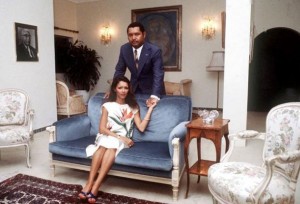A Truth and Reconciliation commission for Haiti?

The way they were: Baby Doc and his ex-wife Michele in the sumptuously appointed National Palace in the Haitian capital Port au Prince. Now, Baby Doc lives with his ‘companion de vie’ Veronique Roy, grand-daughter of a former Haitian president
“Why try Duvalier?” asked the acquaintance I ran into at the supermarket, late in the evening of the day Jean Claude ‘Baby Doc’ Duvalier showed up in court.
“Why not?” I countered.
“What will it achieve?”
“Peace. Brotherly love. Acceptance. The courage to go on,” I replied, a tad flippant.
“Really?” he said incredulously. “Here, in Haiti, you think that such a case can be tried and the country will remain unaffected?”
“Well, it’s got to be done, don’t you think,” I began, tailing off ineffectually as I realized the basic truth of what he said.
“Don’t you think that sort of thing is best done in The Hague? Especially for a country like Haiti? Haiti needs stability, not this row over Boby Doc.”
I thought back to South Africa’s Truth and Reconciliation Commission. If ever it were needed, it is needed here. As also in Rwanda (as I discovered when I visited back in 2011).
For Haiti – and probably everywhere else there’s bile on account of much spilt blood – the restorative justice model of the South African Commission is the way to go. It consciously, strenuously and publicly avoided victors’ justice. Its reconciliatory approach in dealing with human rights violations contrasted with the confrontational Nuremberg method. For many, it remains the gold standard when people have to deal with difficult issues of blood, belonging, brutality, benighted behaviour.
But it’s debatable if it could have come to pass without Nelson Mandela.
So, where’s Haiti’s Mandela? Please don’t say, yet unborn.


